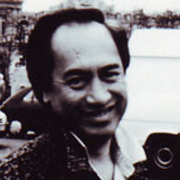
Witi Ihimaera
Gisborne-born Witi Ihimaera began writing on the bedroom wall of an East Coast farm. In the 60s he dabbled in journalism and did time as a postman, a job which took him to Wellington. From early on Ihimaera used fiction as a way to express his experiences of being Māori. A year after completing a Bachelor of Arts in 1971 his short story collection Pounamu Pounamu was published, followed by award-winning novel Tangi. Ihimaera talks about his journey as a writer in this 1982 Kaleidoscope special, and a 1997 documentary made for Work of Art, and returns to the East Coast for this documentary from 1986.
The stories in Pounamu, Pounamu would inspire three screen adaptations and a job. After Prime Minister Norman Kirk read it, he suggested Ihimaera join the Ministry of Foreign Affairs. Ihimaera spent much of the next 16 years at the ministry, mostly as a diplomat, before becoming a professor at Auckland University. He began at Foreign Affairs as a writer, where among other things he worked on a film script; academic Paul Millar argues the resulting film Maori (1981) "is a promotional exercise with little resemblance to his original intentions".
The first television adaptation of Ihimaera's fiction was Big Brother, Little Sister, made for landmark 1976 series Winners & Losers. The series was based on Kiwi short stories, with Ihimaera the newest writer to feature. Finding it "easily the most powerful" episode, writer Trisha Dunleavy describes Big Brother, Little Sister as "the first television drama to explore the alienation of Māori in a contemporary urban setting". Echoing later arguments over Once Were Warriors, debate ensued over whether its portrait of domestic violence highlighted important social problems, or encouraged negative sterotypes about Māori.
Four years later Sam Pillsbury adapted story 'The Truth of the Matter' into Against the Light. The plan was for a series based on Māori and Pākehā writing about race relations. Instead Pillsbury's pilot episode sat on a shelf for 18 months, before screening on arts show Kaleidoscope. Described by writer Lawrence McDonald as "strong and confrontational", the film (and story) retells an incident from multiple, Rashomon-style points of view — in this case that of a Pākehā taxi driver attacked by two young Māori.
In 1983 Larry Parr adapted The Makutu on Mrs Jones, revelling in the comical elements of this 40s era culture clash tale between a local tohunga and a fiesty Pākehā woman.
To date the best known screen adaptation of Ihimaera's work is Niki Caro movie Whale Rider. Inspired by the arrival of a whale in New York, witnessed from his apartment overlooking the Hudson River, he wrote the first draft in three weeks. The event reminded him of the Ngāti Porou legend of Paikea, a tribal ancestor arriving in New Zealand by whale. Ihimaera decided to make his hero a girl after his daughters asked why heroes in action movies were always male, and the girls so often helpless. In 2003 he called the novel the one "the Māori community accepts best".
Ihimaera was in Toronto in September 2002 to witness standing ovations at Whale Rider's first international screenings. "Tremendously moved" at the reaction, he argued that the film's appeal lay in its universal message. "I think it is able to transcend its nationality and its location and speak to the heart in a way that is fresh." Whale Rider won international acclaim, almost 30 awards, and became the second most successful independent film released internationally in 2003. The following year the book was adapted for the stage.
In 2008 Ihimaera completed a script based on his 1986 award-winning novel The Matriarch, he completed the script as part of a writer-in-residence program with the Binger FilmLab in Amsterdam.
Ihimaera won headlines with 2009's The Trowena Sea, after reviewers found unintended "correspondences" between the novel and other texts.
In 2010 semi-autobiographical coming out tale Nights in the Garden of Spain was adapted for a TV movie; among other changes the main character went from a European "everyman character" to a Māori. Ihimaera also served as a co-producer and script consultant on occasional series What Really Happened, which takes a mock-doco approach to historical events.
In 2011 he contributed a range of lyrics for Charlotte Yates'-helmed musical project Ihimaera, and was interviewed for the accompanying documentary which screened that August on Māori Television.
Other screen projects for Ihimaera include White Lies (2013), based on his novella Medicine Woman. Helmed by Mexican director Dana Rotberg, the film stars singer Whirimako Black as a Māori healer asked to hide a secret. Novel Bulibasha inspired 2016 feature Mahana, the first Kiwi project directed by Lee Tamahori since Once Were Warriors in 1994. The story chronicles clashes between two shearing families in the 60s, one led by a domineering patriarch.
Sources include
Trisha Dunleavy, Ourselves in Primetime - A History of New Zealand Television Drama (Auckland University Press, 2005)
Bess Manson, 'Ihimaera's Whale film makes wave of success' - The Dominion Post, 17 September 2002, Page A3
Lawrence McDonald, 'Waking From a Fretful Sleep: Film in the 1970s' in New Zealand Film - An Illustrated History (Wellington: Te Papa Press, 2011)
Paul Millar, 'Ihimaera, Witi' (Profile) New Zealand Book Council website. Accessed 9 October 2012
Wendy Mitchell, 'Witi Ihimaera to work on Matriarch adaptation with Binger Lab' - ScreenDaily, 9 July 2007
Guy Somerset, 'The incredible likeness of being' (Interview) - The Listener, 14 November 2009, page 14
'Nights in the Garden of Spain' The Big Idea website (Broken link). Loaded 23 December 2010. Accessed 9 October 2012
Whale Rider press kit